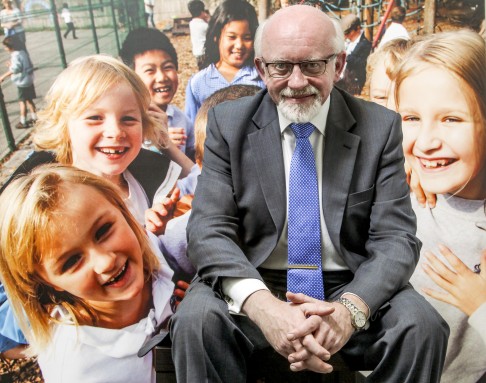
High-achieving international school, Nord Anglia, to open campus in Hong Kong
Boosting children's self-confidence and nurturing independent learning habits are the key aims of high-performance international school, writes Linda Yeung
Since coming to Hong Kong in January, Brian Cooklin has been busy making selections. The principal of Nord Anglia International School has been swamped with more than 1,000 teaching and 500 student applications as he prepares for its opening in September.
The Scotsman, who more than 40 years of experience as a teacher and a principal, is focused on finding the right staff, which he considers most important for the development of a school.
I want to make sure our graduates can contribute to society in any way
Nord Anglia is part of an educational group, owned by Baring Equity, which runs 29 schools across the world. Cooklin declined to address concerns raised by some parents about whether the school chain will be accountable to them or shareholders; however he said the group's unique teaching approach has enabled students at its other branches to turn in outstanding performances.
The new school in Lam Tin is one of the limited number of Nord Anglia campuses built from scratch, Cooklin says. Billed as a non-profit institution, it will also open its sports facilities for public use and offer adult courses - such as English - on campus during non-school hours.
Nord Anglia schools have a high-performance learning approach that seeks to bolster students' self-confidence and independent learning, based on learning methodology and cognitive development developed by Oxford professor Deborah Eyre, the former head of Britain's Gifted and Talented Academy.
Cooklin says it's easy to dash children's confidence, so the school will never tell a child "you can't do this" or "you are not good at arts in class".

As in other parts of the world, the school will run workshops to teach parents about the kind of support their children need for further development, intellectually and socially. To nurture good learning habits, students are encouraged to persevere when they face a problem.
"Parents are the number one educators, as teachers we are number two but together we can get success for each child," Cooklin says.
The group runs a global classroom where Nord Anglia students from around the world are linked up online to engage in group discussions for study projects or forums, exposed to fresh and potentially challenging ideas.
But for the high-performance learning approach to work, Cooklin says it is important to have teachers with a passion for teaching and a clear understanding of their students' needs, as well as a familiarity with the individualised learning method. About 40 teachers have been recruited so far.
"We expect teachers to base their planning of the class very much on each individual child, what he has to do to improve," he says. "This is about a whole set of strategies about how you use assessment, technology, questioning in the class and the way you encourage independent thoughts."
That is why in recent months the school has conducted cognitive ability assessment among student applicants in four areas: verbal, non-verbal, quantitative and spatial. The diagnostic assessment helps inform the school of what is required for a child to move to the next level of learning.
"Before our teachers see the children, they will have information about them: what each child will respond to, what they are good at, the way they will enjoy learning and their preferred learning style. That helps with lesson plans."
The admission of students is not based on screening but on factors such as keeping gender balance, and the right mix of intake. The school adopts the English National Curriculum which has a strong focus in the primary years on English, maths and science. But given China's economic clout, the learning of Putonghua will be compulsory for future students from Year 1.
By Year 5, they will be learning an additional language - Spanish. Practical usage aside, Cooklin says learning more than one language benefits overall learning because research has shown that it has a spillover effect on other parts of the brain.
While academic success opens the door for more choices of educational opportunities, he stresses that success rests on students' all-round development that can only be brought about by holistic education.
"I have seen doctors who are very intelligent, doing very well but can't talk to another person. I want to make sure our graduates can contribute to society in any way, have respect for others and that sense of confidence, and can contribute effectively right across the board."
In September, it will offer 400 places for Year 1-7 students, with Year 8 and 9 to be added in the following year. All income from various kinds of fees will be invested into the school, says Cooklin. To offer through education, it is in discussion with the Education Bureau on building a school extension near the existing campus for Year 10 to 13.
